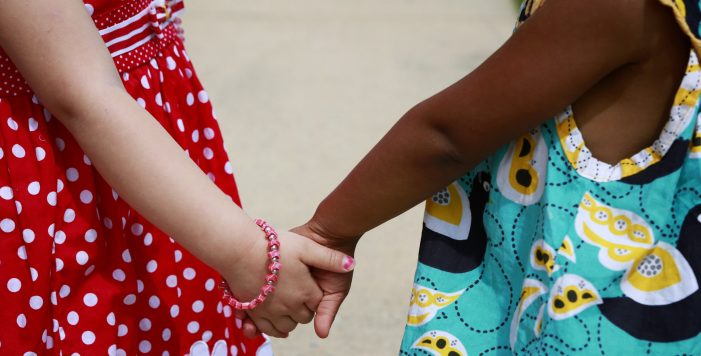How Child Abuse and Neglect Plant the Seeds of Racism in Our Children

In the United States of America, it is a time of reckoning. As a nation, as a people, who do we want to be?
Divided? Filled with hate and judgment of each other? We must decide.
In 2016, a reader commented on my blog, and it made me think deeply about anger, hate, and the harsh way that humanity judges and treats those who are different from ourselves. That reader’s comment inspired me to write this blog post on Psychcentral. Today, in 2020, it is still highly relevant. I have updated it and republished it here.
The Comment (Slightly Edited)
I’m a white working-class man. I was abused physically, sexually, and emotionally by people I trusted as a child.
The unquenchable anger from the white working class is not caused by a government or system or any other institution. It is caused by neglectful and abusive parenting. You simply can’t stay that angry, resentful, and cruel all your life if you grew up with loving people, no matter what government you have.
When people call others, like millennials, “pampered” what they are really saying is that they wish they had received that kind of care when they were young. When they brag how their toys and playgrounds were unsafe and they turned out OK, what they are really saying is that they wish someone had cared enough to put rubber matting under their own swings when they were growing up.
These people’s parents, guardians, and leaders deflected their own anger from the true target, their own parents, to “others” who did not look like them.
As a child, your parents really scare you when they spit out whatever nasty words they may have used to describe people who are of different races or creeds. You get afraid of these people, and because they don’t look nor talk like you they are very easy to spot. The working-class white people’s current anger is the flip side of genuine fear. A fear you were taught before you could form words.
A man stood on my street corner the day after the election and shouted to all of us, “Those ****” are going to get what’s coming to them now.” He looked like a 60-year-old teenage boy who can’t stop being afraid.
Neglect and abuse are passed down like a family heirloom and often go side by side. Parents will often go from one to the other as the day goes on.
As a trained therapist I believe you could provide much value by teaching people with this much hate how to break the chain of hate by raising their children with attention and love.
Anger
Truth be told, I felt somewhat stunned as I read this comment. It expressed in perfect prose some things that I know, with every fiber of my being, are fundamental truths.
Yes, anger is the flip-side of fear.
Yes. The way we treat our children shapes our world.
Yes. Of course. Childhood neglect and abuse are the root causes of anger, racism, and hate.
Anger is a fascinating emotion in many ways. It flows like water, touching and affecting all who are near it. One important way that anger differs from other emotions is that it always seeks a target.
Anger is not satisfied floating freely, like sadness or other forms of pain. Anger is built into us as a self-protective measure, so it naturally needs to be directed at someone or something.
So what if that “someone” who’s the true target is our parent? Our parent who is angry or scary, or inattentive. Our parent who has hurt or neglected us, but upon whom we are completely dependent for food, clothing, shelter, and all forms of care.
A child’s own anger seeks another, safer target; one removed as far as possible from our childhood home. The farther removed the target, the safer it feels for us. It’s a natural human process that is virtually wired in.
How You Can Help Break the Cycle
- Be aware of your own childhood-based anger. If you grew up ignored or in any way abused, you do have anger about it. And it’s okay. In fact, it’s healthy.
- Listen to the messages of your own anger. What’s it trying to protect you from now? Is it really people who are different from you? Or is your anger actually trying to protect you from the people who, for whatever reason, failed to protect you or nurture you, or even actually harmed you, as a child?
- Work toward the courageous act of directing your anger where it truly belongs. When your anger goes toward its true target, it will at first feel painful and scary. But this is a huge step toward your own psychological and emotional health. Your tremendous courage will pay off for yourself and for your children.
Here’s what I believe. Racism will never go away until we all face the true source of our own fear and anger. I hope that we can stop misdirecting our feelings, and have the courage to parent our own children differently than we were parented ourselves.
Let’s face our own pain, and work through it in a healthy way. It’s for the children. It’s for our country. It’s for our world.
Childhood Emotional Neglect can be invisible and unmemorable so it can be hard to know if you grew up with it. To find out, Take The Emotional Neglect Test. To learn more about how CEN affects relationships see my new book, Running on Empty No More: Transform Your Relationships. To learn more about Childhood Emotional Neglect, see my first bookRunning on Empty.
Warm thanks to Tyler, who authored the candid, thoughtful comment that inspired this article.
This article was originally posted on Psychcentral. It has been updated and republished here with the permission of the author and Psych Central.
